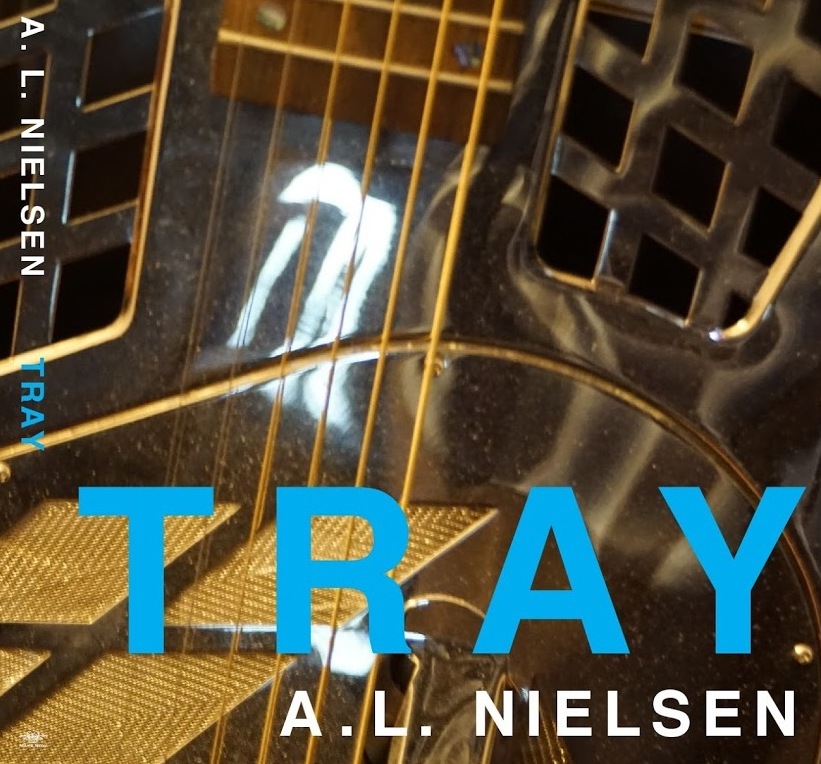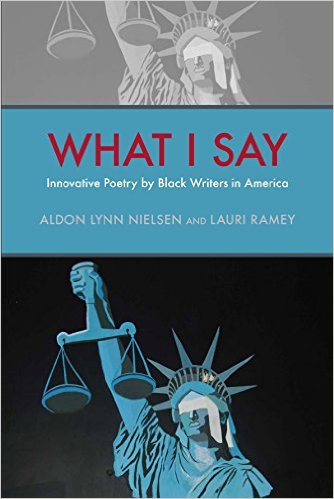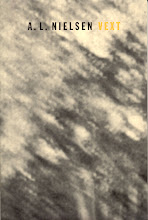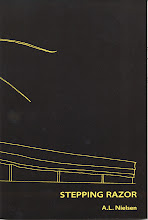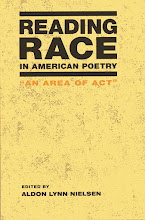Thursday, August 30, 2012
Friday, August 24, 2012
NEW FROM FRED WAH
Speaking of Fred Wah, the Canadian Poet Laureate has a new chapbook out from the memorably named Book Thug. Wah's note on the text informs readers that the book grew out of a workshop titled "How to Write a Poem for the Queen." A meditation on the occasional poem by a poet who is asked to meet such an occasion . . . "Can a 'poem in honour of' engage a similar discourse to the poem simply written 'For'?"
I was born, speedy creek, below freezing
White snow and sheets
Now the prairie light so incomplete
Between two sentences
Click here for ordering and other information.
Monday, August 20, 2012
LOOKING UP HARRYETTE MULLEN
The good people at Belladonna Press provided me with a copy of this delightful book last summer just as I was heading off to the University of Kansas to teach a graduate seminar. I took the book along with me, thinking that I should at least mention it in the course as the seminar was a study of developments in innovative African American poetry, only to find that one of the students there had already read it. Word travels quickly in the poetry world.
I'm glad that the book has a subtitle so that people picking it up won't expect something like George Butterick's Guide to Olson's Maximus, or even just pages of glosses. This book is not intended to fill in the background for every allusion in Muse and Drudge (but I do wish more readers of Muse & Drudge would listen to "I'm Your Puppet" by James and Bobby Purify).
That said, you can learn a great deal about individual passages of Mullen's work in the pages of this book. Much of it is correspondence, a post-card interview stretching across a period of time, in the course of which you can follow Mullen thinking through the issues that Barbara Henning brings up. There's also a fine introduction by Juliana Spahr.
You can find out more about this book by clicking here to visit Belladonna Press.
Thursday, August 16, 2012

I recently visited poet/editor/publisher Susan Schultz at her home in Kane'ohe, Hawaii. That's Susan with her back turned taking a cell phone photo of a dragon fruit, and this is the very dragon fruit she is shooting. Back there in the kitchen you can see husband Bryant putting the finishing touches to a wonderful dinner. Daughter Radhika is keeping an eye on the Olympics for us.
I first became aware of Susan's work when I read some of her poems in journals years ago, but I think our first meeting was at a reading we did in D.C. organized by Rod Smith and company.
One of the great customs among traveling poets is the exchange of books. I left that night with copies of two recent volumes from Susan's TinFish Press, The Revolution Happened and You Didn't Call Me, by Maged Zaher (easily one of the best titles of the year), and my friend Tim Yu's intriguing 15 Chinese Silences, without a doubt the best thing ever to come from reading Billy Collins. You can learn more about TinFish editions here.
My journey was also rewarded with a copy of Susan's own Memory Cards: 2010-2011 Series, pieces composed to fit on a time card or index card (some flexibility in that form -- back when I was using index cards for lectures, I favored cards the size of a paperback book) -- including my own favorite, Susan's "George Oppen Series."
Reading so well worth a journey of a thousand miles is hard to come by. You can find out about Susan's Memory Cards and other Singing Horse titles here.
Sunday, August 12, 2012
Saturday, August 11, 2012
Fred Wah on EVACUATION ROUTES
| Aldon sent along this nice chapbook reprint (original 1992),
Escamotage Editions 2012. Thing about the sentence in these mostly prose
pieces is that it does such wonderful things when it’s not in service
to the narrative; these sentences scurry and hide like escaped slaves. But this fits since I’m also reading James Clifford’s Routes: Travel and Translation in the Late Twentieth Century and thinking of a quote there from C.L.R. James: “…movement, not where you are or what you have, but where you come from, where you are going and the rate at which you are getting there.” Try putting that onto the sentence! |
Subscribe to:
Posts (Atom)









